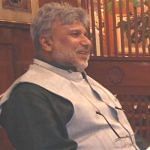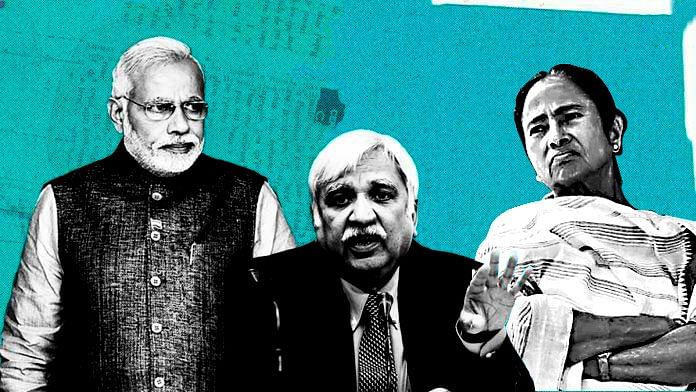The Election Commission’s move in West Bengal to ban all political parties from campaigning after 10pm Thursday once again led to allegations of EC bias. West Bengal CM Mamata Banerjee also questioned the timing of the ban, which comes to effect after PM Narendra Modi’s two election rallies.
ThePrint asks: Bengal EC move: Should all-party panel appoint election commissioners to avert bias charges?
Questioning EC appointments is like questioning EVMs – something only losers do
 Shishir Bajoria
Shishir Bajoria
State executive member, West Bengal BJP
Questioning the appointment of Election Commissioners is like blaming the EVM, which losers always tend to do. Those who are staring defeat on 23 May have now resorted to raising questions about the neutrality of the EC.
The BJP too has its grievances with the EC. The party has demanded action to be taken against West Bengal CM Mamata Banerjee for publicly asking the people to “threaten and intimidate voters”. We are still awaiting action from the EC. But that doesn’t mean the EC is biased.
The EC acts when they feel appropriate, and their decision is their prerogative.
It seems there is a separate law for West Bengal and another law for the rest of India. On 13 May, the state’s home secretary had the audacity to instruct the chief electoral officer on how the central paramilitary forces should be deployed. The state police is being used as a uniformed force of the TMC.
It is appalling that such people are questioning institutional bodies like the EC. This is nothing but a loser syndrome. In cricket, not every appeal results in an ‘Out’.
Panel to appoint ECs should not only have representation from all parties but the Supreme Court too
 Jaskirat Singh
Jaskirat Singh
Coordinator, Association of Democratic Reforms
India’s Constitution has vested extraordinary powers and responsibility on the Election Commission of India. Elections are an important part of our democracy, and it is the Election Commission’s responsibility to ensure a level playing field. This is why an all-party panel is even more important to make appointments in the EC, than other institutions which have an all-party panel.
The EC can do anything it deems fit to ensure free and fair elections. In such a scenario, when the EC has such enormous powers, it is very important for the EC to be completely unbiased. We should have a panel with representation from all sides, and not just the opposition but other institutions like the Supreme Court as well. Perhaps, the CJI can also be on the panel.
This is not to say that the appointment in itself is at the root of all problems. We have been lucky to have reasonably good election commissioners in the last 15-20 years. This means the system hasn’t always led to the appointment of biased election commissioners.
But we cannot take a chance like this. This election season, the EC has opened itself to a plethora of criticism because of its own actions. Their recent decision in West Bengal has added to this image. The EC needs to be free and fair like a referee or umpire, so that the players abide by the rules of the model code of conduct.
Most EC members have been IAS officers, but at least one member should have a judicial background
 S.K. Mendiratta
S.K. Mendiratta
Former legal advisor, Election Commission
I have argued for a long time that there needs to be a panel to appoint members of the Election Commission. This need not be an all-party panel, but it should at least include representation from the government, the judiciary and the leader of the opposition. The select committee should then make a recommendation to the President.
People may not like it, but I have also said that at least one of the members of the Election Commission should come from a judiciary background. After all, the EC’s procedures are quasi-judicial in nature, so at least someone in the EC should have an understanding of the law. For many years, it has mostly been IAS officers who have been included in the Election Commission. This should change.
Having a select committee appoint members of the EC will also avert and avoid all criticisms of bias that comes its way. Even when the EC has been completely honest and fair, someone or another has always accused it of being partisan. If a select committee makes the appointment decisions, then there no one will be able to accuse it of partisanship.
Also read: Three simple things Election Commission must fix urgently, before solving larger problems
The root of the problem isn’t the appointment procedure, it is the EC’s biased actions
 Saugata Roy
Saugata Roy
Leader, TMC
The present system of appointing election commissioners solely on the government’s recommendation is clearly not working well. But it isn’t like they are being accused of bias because of the procedure through which they were appointed; the election commissioners, including their chief, are being accused of bias because of their actions. There have been Election Commissions in the past that have worked really well. So, while an all-party panel is ideal, the fact that the government alone decides who will comprise the EC isn’t at the root of the problem.
In West Bengal, the actions of the present Election Commission have been preposterous. The way the EC has imposed the ban on campaigning only after 10 pm Thursday to accommodate PM Modi’s rallies points towards a clear-cut case of bias.
There have been so many complaints against Modi and Amit Shah, but not one has been acted upon. So, it is their actions which are inviting all the criticism.
Of course, the appointment method of the EC could use a re-examination. Most of them don’t even have a judicial background. They are IAS officers who have been given a plum posting in the EC.
Also read: Big split in Election Commission as EC Ashok Lavasa stands up against clean chits to Modi
Do re-examine the EC’s appointment procedure but also question Modi govt for creating the mess
 Vinayak Dalmia
Vinayak Dalmia
Spokesperson, Congress
The Congress has immense respect for all constitutional bodies, including the Election Commission. But this present avatar of the EC is a far cry from the previous eras of chief election commissioners like TN Seshan. The previous CECs had built a global reputation of the Election Commission being a firm and fair entity.
Sadly, though, the current Election Commission fails dramatically in comparison to the earlier commissions. The Model Code of Conduct has been reduced to Modi’s Code of (mis)Conduct under this EC headed by Sunil Arora. The EC has to be fearless, brave and rise above partisan politics.
The process to appoint election commissioners has always remained the same, but this problem of bias is surfacing only now. The EC has never been this crippled and afraid. It is just one in the long list of institutions that have been attacked by the Modi government.
So, while it is perhaps a silver lining that recent events have led us to re-examine the appointment procedure, we must also question the Modi government which is responsible for the mess. The conversation around appointment does merit a greater debate and stakeholder engagement, it would be rather simplistic to solely blame the procedure for the diminished independence of the EC.
In West Bengal, for instance, the EC’s order to ban campaigning after 10pm was designed precisely to allow Narendra Modi to hold his rallies. In the past too, the Congress has filed 11 complaints against Amit Shah and Modi, but no action was taken despite these being open and shut cases.
Changing appointment process without understanding reasons for institutional failure is foolhardy
 Alok Prasanna Kumar
Alok Prasanna Kumar
Senior Resident Fellow, Vidhi Centre for Legal Policy
The Election Commission of India has not covered itself in glory in the 2019 Lok Sabha elections. Even accounting for the challenges of conducting the world’s largest and most complex elections, the EC’s performance in 2019 can be described by two words – “slow” and “cowardly”. While “bias” is a strong word to use, and requires more than conjecture to prove, suffice it to say that the EC has not exactly lived up to its enviable track record in the past.
The EC had to be goaded by the Supreme Court’s harsh words to even act in the first place. Even when it has, it has shrunk back from standing up to the BJP’s most blatant breaches of the model code of conduct, preferring to aim its ire against less important, second-rung leaders like Adityanath and Maneka Gandhi. Likewise, its decision to end campaigning early in West Bengal smacks of an effort to look like it’s doing something without upsetting the BJP in any way.
While it is tempting to “fix” this at the next available opportunity, let’s also accept that it would be disingenuous to expect all political parties to applaud the independence and efficiency of the EC if it doesn’t suit their needs. We need a deeper inquiry into why the EC has failed and what measures are needed to fix it. Simply changing the appointment process without attempting to understand the underlying reasons for institutional failure is a foolhardy step.
By Fatima Khan, journalist at ThePrint.




Exceedingly difficult to agree with any of Shri Mendiratta’s broad propositions. How much law did Shri T N Seshan and Shri James Michael Lyngdoh know ? Or, to put it differently, how can an IAS officer who has retired as Secretary to GoI be someone who does not have a knowledge of law ? The sad fact is that domain specialists – which includes lawyers – are told, Hum yeh karna chahte hain. Zara dekh lijiye. Eu achha sa Note file par record kar dijiye. That is what institutions like the ECI are expected to rise above.
Shri S K Mendiratta has a touching faith in how much good a “ judicial appointee “ will do. For the ECs to be appointed by a bipartisan Committee is a much delayed reform; it should cover several other regulators as well. However, this is tinkering at the margins. After the election, a conscious effort will have to be made to start the patient rebuilding of institutions. That includes the media as well. At the moment, the landscape is looking like Orissa after Fani.